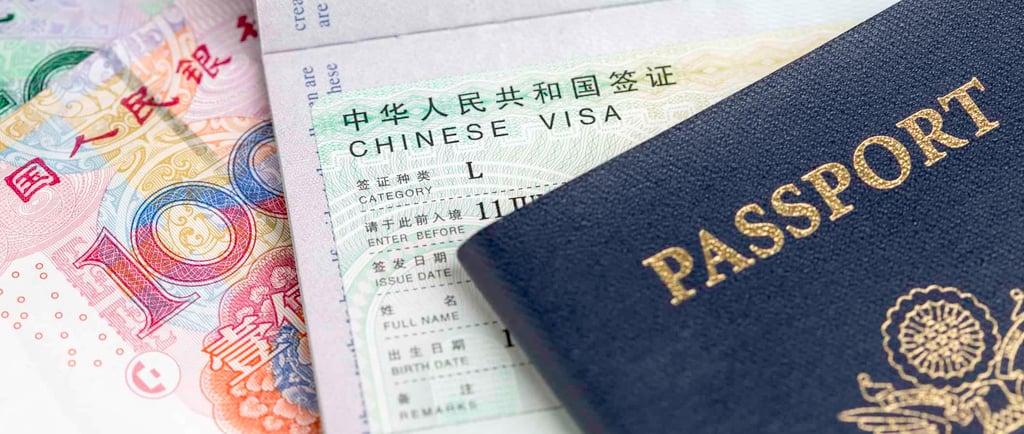China’s New K Visa: Unlocking Opportunities for Global STEM Talent
This initiative is aimed squarely at what the government has termed “young science and technology talent” from around the globe. Far from being a small adjustment, the creation of the K visa is part of a larger, systemic revision of China’s entry and exit rules, signaling a deliberate effort to reimagine how the country engages with international talent.
9/25/20255 min read


China’s New K Visa: Unlocking Opportunities for Global STEM Talent
On October 1, 2025, China will open a brand-new chapter in its immigration and talent attraction policy by officially introducing the K visa category. This initiative is aimed squarely at what the government has termed “young science and technology talent” from around the globe. Far from being a small adjustment, the creation of the K visa is part of a larger, systemic revision of China’s entry and exit rules, signaling a deliberate effort to reimagine how the country engages with international talent. By carving out this special pathway, China is positioning itself as a nation not only eager to attract global researchers, scientists, entrepreneurs, and technologists, but also willing to reshape its administrative systems to make that possible. The message is clear: China intends to throw open its doors wider to professionals who can drive innovation, growth, and cross-border collaboration in the years ahead.
What the K Visa Offers: Greater Flexibility & Scope
The most striking feature of the K visa is its break from traditional immigration models. Unlike many existing visas, whether in China or elsewhere, it eliminates one of the most significant hurdles faced by foreign professionals: the requirement of a confirmed job offer or sponsorship from a local institution before applying. This change alone marks a huge departure from convention, giving applicants the confidence to explore opportunities in China without being locked into a contract in advance.
Holders of the K visa will be entitled to multiple entries into China, longer periods of validity than standard visa categories, and the freedom to take part in a diverse range of activities. They will not be limited to employment alone but can engage in education, conduct research, launch entrepreneurial ventures, initiate business projects, and participate in cultural exchanges. This breadth of scope makes the K visa one of the most versatile in China’s system, essentially blurring the lines between work, study, research, and innovation. For global talent seeking not only employment but also broader professional and personal growth, this flexibility represents a game-changing opportunity.
Who Qualifies: Eligibility Criteria & Uncertainties
While the headline criteria are relatively straightforward, the details of who exactly qualifies remain somewhat fluid. The core concept revolves around individuals recognized as “young science and technology talent.” In practice, this is expected to include anyone holding at least a bachelor’s degree in a STEM field, science, technology, engineering, or mathematics, or those already working in teaching and research positions tied to these disciplines.
However, questions remain. What age range counts as “young”? Will the eligibility extend to graduates from all recognized institutions globally, or only those from a curated list of universities? Will there be a minimum number of years of professional experience required? Applicants will need to provide official supporting documents such as degrees, transcripts, records of professional or research work, and perhaps evidence of achievements in their field. At the same time, uncertainty lingers over whether the K visa will seamlessly lead to longer-term residence options or if recipients will face additional bureaucratic steps once in China. These grey areas will need to be clarified before the program can reach its full potential.
Why China Is Launching This Now: Strategic Context
The timing of this visa is far from coincidental. The introduction of the K visa reflects China’s broader national strategy to become a global leader in science, technology, and innovation. By launching such a program now, China is positioning itself as a country that recognizes both the challenges and opportunities of global talent mobility. At a time when many other nations are tightening restrictions on skilled immigration, China is striking a very different tone: a more open, flexible, and welcoming alternative.
Beyond simply attracting fresh international talent, the K visa also serves another purpose: it creates incentives for return migration. Many Chinese professionals working abroad may now see new reasons to return, either temporarily or permanently, to contribute their expertise within the country’s growing innovation ecosystems. Furthermore, this initiative has the potential to boost not only established hubs like Beijing and Shanghai but also emerging technology clusters in smaller cities, thereby spreading innovation more evenly across the nation.
Benefits, Challenges & Risks
The potential benefits of the K visa are enormous. By welcoming young, ambitious professionals from across the globe, China could inject new energy into its universities, research institutions, and entrepreneurial ecosystems. The arrival of such talent could strengthen international collaboration, accelerate scientific breakthroughs, and fuel the creation of dynamic startups. In short, it could serve as a powerful catalyst for China’s long-term economic and technological ambitions.
However, the challenges are equally significant. Attracting talent is only half the battle; retaining it is the true test. Without a strong ecosystem of support—research funding, housing options, professional networks, and cultural integration programs—foreign professionals may see China as a stepping-stone rather than a permanent base. Issues such as transparency in administration, protection of intellectual property, and ensuring fair treatment across the board could also impact how widely the visa is adopted. These risks will need to be carefully managed if the K visa is to live up to its promise.
Key Implementation Details to Watch
Much of the K visa’s success will hinge on the fine print of its implementation. Over the coming months, authorities are expected to release detailed guidelines that define eligibility more precisely, set age thresholds, clarify the validity and extension terms, and establish consistent application procedures. Efficiency in processing applications across embassies and consulates worldwide will be critical to building credibility and confidence in the system.
Additionally, certain regions within China may add their own local incentives to complement the national policy. These could include startup funding, subsidized housing, or dedicated grants for research projects. If rolled out effectively, such measures could make China’s emerging tech hubs even more attractive destinations. Ultimately, the program’s success will depend on its ability to deliver a system that is transparent, efficient, and welcoming—qualities that matter deeply to international professionals considering such a major move.
Outlook: Is This a Game Changer?
The introduction of the K visa is more than just a new immigration category—it is a bold statement of intent in the global competition for talent. By lowering traditional barriers, expanding opportunities, and directly targeting youthful innovators, China is signaling its readiness to become one of the most attractive destinations for global talent.
Yet the final outcome will depend on more than just the existence of the visa itself. The real test lies in the lived experience of those who take this pathway—whether they find an environment that is not only open to their arrival but also supportive of their growth, innovation, and long-term contribution. For global STEM professionals weighing their options, the K visa represents a fresh and promising pathway to engage with one of the world’s most dynamic and fast-evolving innovation landscapes. If implemented with vision and care, it has the potential to reshape global talent flows and place China at the very center of the international race for ideas and discovery.
We are here to guide you to your dream destination: Connect with us on:
📞 Call/WhatsApp: +234 912 799 6321, +234 707 795 3867
📧 Email: contact@astraltrailng.com
📱 Instagram & Facebook: @astraltrail
🌐 Website: astraltrailng.com
Destinations
Astral Trail is an expert educational consultancy and travel agency that provides consulting services to study and relocate abroad. We are continually expanding our capabilities and reach on a daily basis.
© Astral Trail 2025. All rights reserved.


Phone: +2349127996321, +2347077953867
Email: contact@astraltrailng.com
Address: 10 Wale Osoba Close, Martins,
Akute, Ifo LGA, Ogun state, Nigeria, 112005
